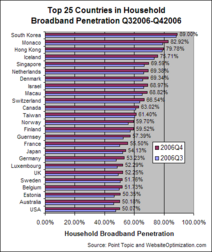 Pointing out the tiny little problem with globalization,
namely that with fast global data networks many jobs
from doctors and lawyers to clerks become offshoreable,
an economist tries to look ahead:
Pointing out the tiny little problem with globalization,
namely that with fast global data networks many jobs
from doctors and lawyers to clerks become offshoreable,
an economist tries to look ahead:
What else is to be done? Trade protection won’t work. You can’t block electrons from crossing national borders. Because U.S. labor cannot compete on price, we must reemphasize the things that have kept us on top of the economic food chain for so long: technology, innovation, entrepreneurship, adaptability and the like. That means more science and engineering, more spending on R&D, keeping our capital markets big and vibrant, and not letting ourselves get locked into “sunset” industries.If this is the case, then it would seem that promoting innovation by promoting a fast, open, and participatory Internet would be important for the U.S., and also important to the rest of the rest of the world that wants the U.S. to remain a major market.— Alan Blinder: Free Trade’s Great, but Offshoring Rattles Me, Grasping Reality with Both Hands: Brad DeLong’s Semi-Daily Journal, 5 May 2007 quoting Free Trade’s Great, but Offshoring Rattles Me, By Alan S. Blinder Washington Post, Sunday, May 6, 2007; B04
-jsq
 Sometimes Bob Frankston makes me shake my head in wonder:
Sometimes Bob Frankston makes me shake my head in wonder:



